Watching Notre Dame burn last evening, switching back-and-forth between American television and a French cable channel, I felt wounded, witnessing the destruction of something highly personal. Like so many others, I was stunned and sickened, and even with the commitment made by the French president to rebuild – and no doubt they will – for anyone who has lived in or visited Paris, seeing the Cathédrale de Notre Dame de Paris burn was surreal and heartbreaking.
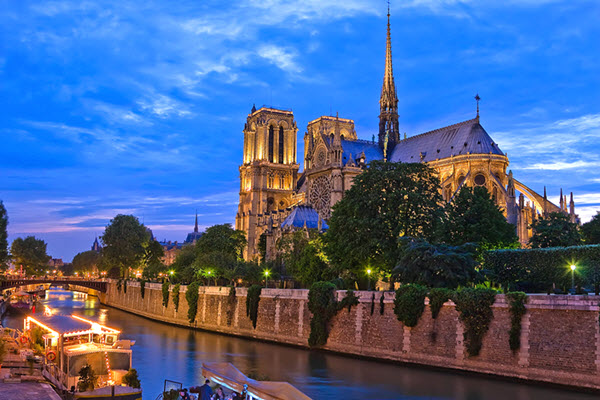
It seems impossible not to experience this as a loss of significant weight. Notre Dame, throughout her history (850 years), has been tarred and scarred, but she has endured as a place of beauty, art, culture, history and spirit. To see her possibly irrevocably damaged is a dismal prospect, particularly in an era when we need beauty and art and culture and spirit – and a grander view of human history – just to get us through the ugliness of too many devastating days in the world.
It’s hard not to feel just a bit more vulnerable.
For Christians, especially for Catholics (and during Easter week!), this must be even more painful a blow.
In all the times that I lived in Paris, going back some 40 years, I could navigate by the spire of Notre Dame, and yes, the Eiffel Tower and the Tour Montparnasse as well. But whenever the choice was mine, I planted myself in the oldest arrondissements (neighborhoods) in the heart of the city, with Notre Dame only a few blocks away, her towers and her spire my guide. Watching her burn, even on television, was — and still feels — profoundly sad.
While every time I lived, studied, worked in or visited Paris was not happy per se, much of the time I spent there, in fact, was. For anyone who reads here (or has over the years), you already know how special Paris has been for me, whether I’m going on and on about café au lait or beet salad or my adoration of the inimitable macaron. And yes, I’ve been even more expressive (and appreciative) of the importance of French men in my life. But you may not fully realize that I have been more alive, more myself in France and especially in Paris, than anywhere else in the world. It was there that I first felt independent and “whole” when I was a on my own (and speaking French!) for the first time as a 15-year-old girl. My first love, arguably, and from a much younger age, was the French language itself, and my first lover as a young woman, a Parisian. It was under the gaze of Notre Dame de Paris where I got engaged, or rather, where my husband-to-be popped the question one evening on a bridge nearby. (He had to do it a second time later in the evening; initially, I thought he was kidding.)
Over the course of decades, it was also in Paris that I discovered modern and contemporary art in the most exquisitely personal and tangible way, through its galleries and gallerists, through artists willing to speak with me and collectors with a shared (consuming) passion, and where, eventually, I had the privilege of reviewing remarkable masterwork for two art magazines I greatly admired.
Paris is a place where I fell in love, where I lived bathed in the feeling of being loved, where I wrote from an abundance of love for life itself; where love (like art) took on a grander and yet more grounded cast for me; where I was lighter, braver, stronger. Yes, the romanticism of the young girl, still, is evident when I reminisce, and in my most recent visit a few years ago – where Notre Dame was again a “must” for her powerful sense of spiritual and historic grandeur, where I felt small in the best possible way – I couldn’t ignore the dissonance of seeing armed officers patrolling the streets in our era of terrorist attacks.
Even so, I felt gleeful and energized and chez moi in the center of the city, strolling its narrow cobblestone streets, navigating its most ancient neighborhoods in the shadow of Notre Dame, so much the city’s enduring heart. And so my own heart aches for Paris and its people, for the French wherever they find themselves who feel such identity and affinity for “Our Lady,” and for everyone to whom she remains a cherished place of spirit and history and something larger than ourselves – inspirational and aspirational – at a time in the world when we desperately need it.
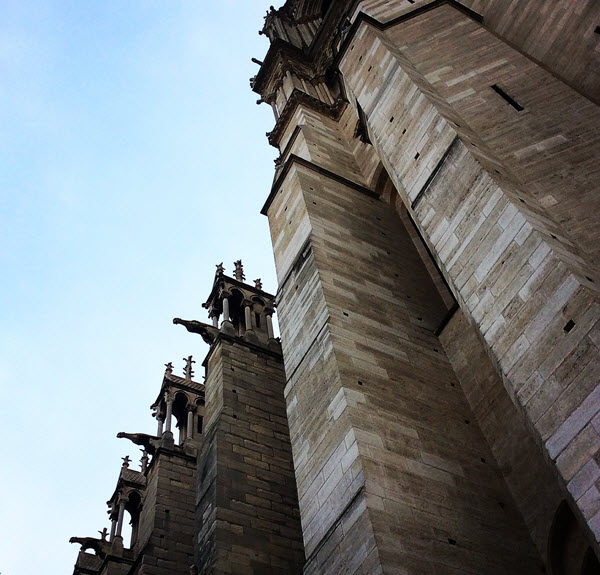
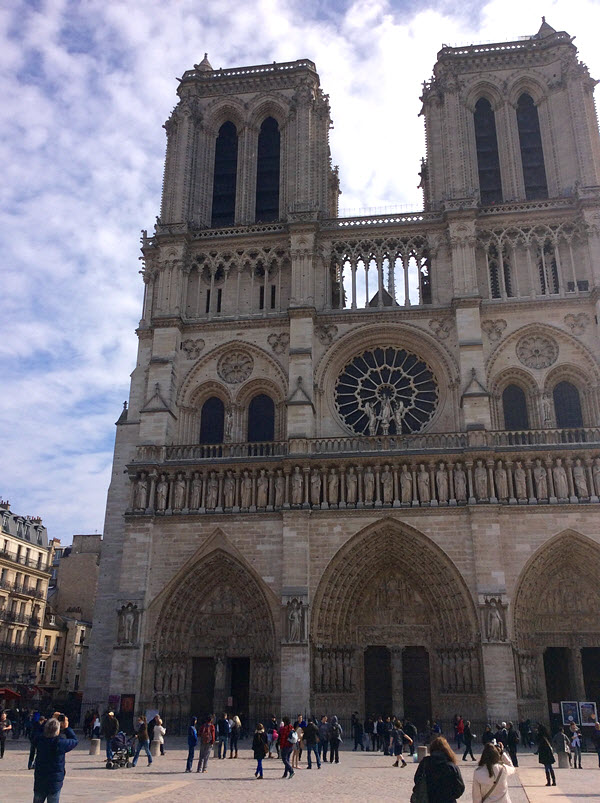
Some of you may think, What’s the big deal? There’s so much more to worry about, to collect funds for, to repair in our troubled world.
I get it. I do.
But religious or not, “spiritual” or not, a lover of France and history and art and culture or not — don’t we need soaring spaces and spires that inspire, and lead us to aspire to something grander than ourselves? Don’t we need our places of beauty and spirit now more than ever? Aren’t we reminded, even in tragedy, of the extraordinary achievements of humankind when we work together and when we give ourselves to striving and creating, however messy and imperfect the process?
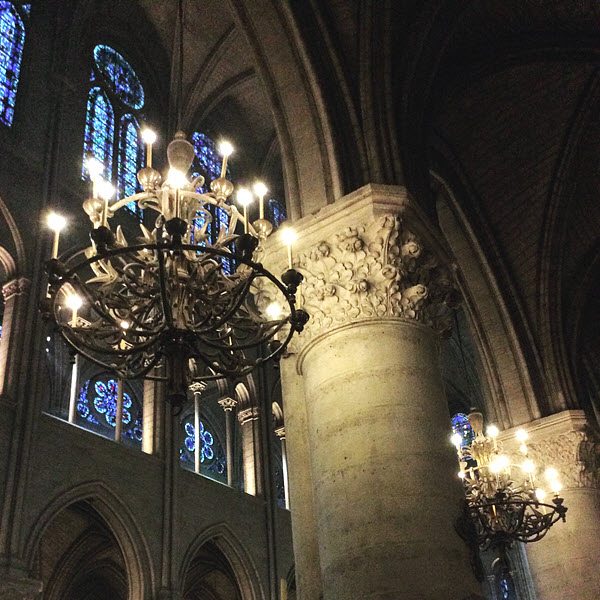
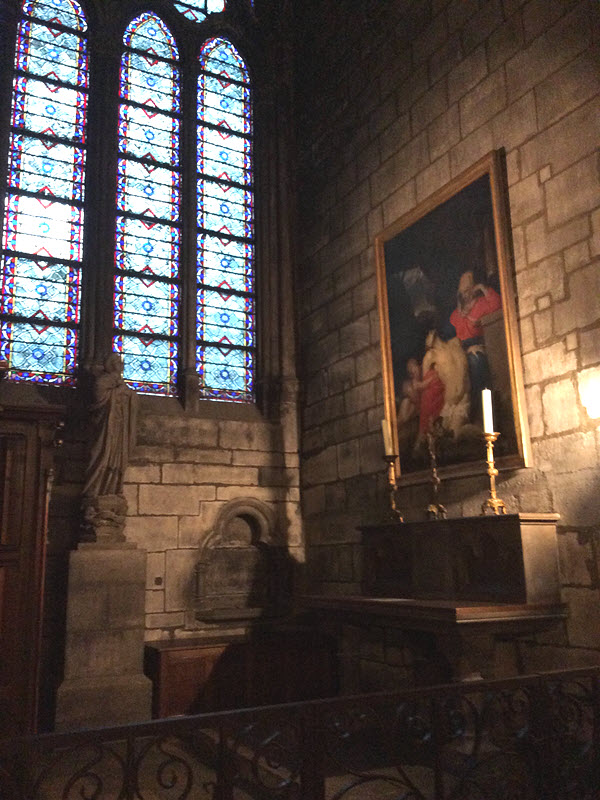
I don’t know if I will ever navigate by Notre Dame again or even travel to Paris again, much less enjoy an extended stay. But in my heart, I hold so many wondrous memories of the City of Light that I feel forever fortunate. And I hope that Notre Dame will indeed be lovingly restored, that generations more will worship in her embrace, that others will admire her and experience her and navigate by her beauty and spirit, understanding what was lost yesterday, and appreciating our human capacity, always, to rebuild.
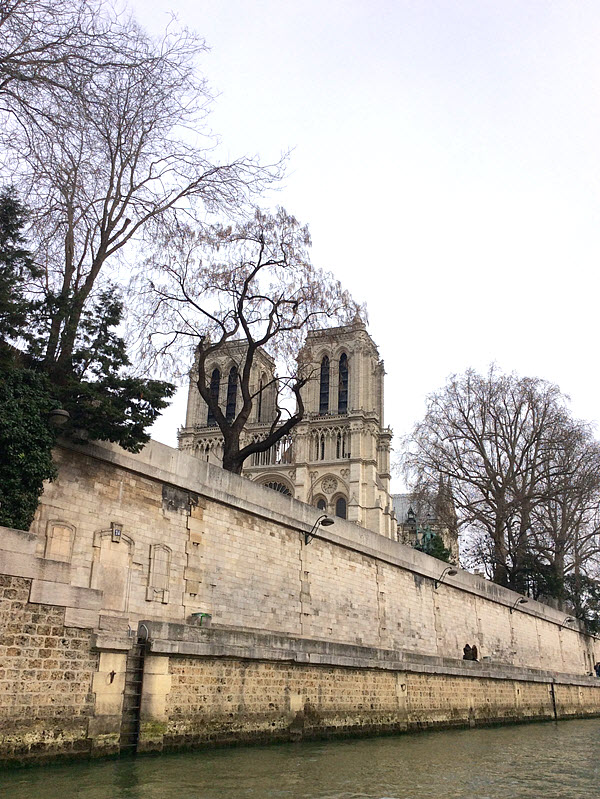
You May Also Enjoy
Lovely. Heartbreaking and hopeful. I’m so saddened by this loss and so thankful to have spent time in and around her.
Such a lovely post, DA. Thanks.
The towers are still there, and you will certainly navigate by them again. The French are experts in renovation and restoration. I have hope.
Yes. Hope.
This morning I heard two wealthy French families have pledged $350M for the restoration and the group that rebuilt Windsor Castle has offered to help. It was built in the 11th C. This is a tragedy not just for those who love Paris but for the world as well.
I’ve been away from my devices since this morning… so glad to hear this and to see, already, the people and organizations stepping up. And also, that a human chain — extraordinary — was able to save so many of the treasures.
And what we owe to first responders and firefighters, as in this case, is always beyond measure.
I am a retired French teacher who went to Paris alone for the first time. As I walked the streets, I felt as if my soul had found its home. After I retired, I try to go most years for a month, staying in the same apartment each time. I adore my time there, sometimes with a visitor or two but mostly alone. And I am not lonely; the city keeps me company! I, too, am broken-hearted and completely devastated. How could this happen? But it did and I, like the rest of those who love that place, will watch as the restoration is complete. I hope I am still around for that joyous moment!
Exactly, Ruth! The city itself is such sweet company. (Shall we organize a “field trip” to see ND’s renovations in a few years’ time? Espérons. 🙂
So much sadness. Rest your heart, D.A.
I was terribly saddened to see the Cathedral fire, especially as a European vacation (if not move) is one of the major items on my bucket list. I too see the existence of such historical structures as objects of cultural soothing and stability, crucially important when other aspects of culture (seemingly worldwide) are increasingly in upheaval.
But – I just saw a Facebook meme pointing out that we have more of an emotional connection to such objects than we do to our natural world. Why don’t we have the sorrow over that kind of loss? My first reaction was offense – “He doesn’t get it! Why is he using this tragedy to piggyback other issues? Show some respect”.
My second reaction was “He has a point, culture isn’t the only important issue”. We are standing idle, being distracted as disruption of entire ecosystems, species, ways of life (and buildings) is either underway or heading our way. If you are prone to think that way, the burning of the cathedral can be seen as a metaphor for imploding society. While I don’t think there is a literal connection, scientists know what a tenth or two-degree temperature change translates into in terms of forests fires, property loss, and economic (and possibly social) disruption. The cathedral fire is probably not a “canary in the coal mine” indicator of climate change, but it has already been pointed out that pollution has had a physical effect on the building. They are not unrelated.
I hope this reply doesn’t spark responses like my own initial one. I certainly don’t consider myself an activist on climate or the natural world. My interest is almost exclusively cultural, social and economic and I grieve over the lost contribution of the Cathedral as a cultural cornerstone. But this does illustrate that Greta Thunberg, the fifteen-year-old Swedish climate activist, has a point. What is more important than making sure our world lets us survive? Timeless treasures lose their meaning if the context in which they exist is not revered also.
I looked forward to reading your thoughts on this matter, as you came to mind as I saw the news and grieved. I haven’t been privileged to visit Paris and regret that I will not ever see the Great Lady as she was. I hope I can see her one day restored.